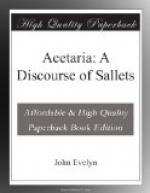12. Cardon, See Artichaux.
13. Carrots, Dauci, or Pastinaca Sativa; temperately warm and dry, Spicy; the best are yellow, very nourishing; let them be rais’d in Ground naturally rich, but not too heavy.
14. Chervile, Chaerophyllum, Myrrhis; The sweet aromatick Spanish Chervile, moderately hot and dry: The tender Cimae, and Tops, with other Herbs, are never to be wanting in our Sallets, (as long as they may be had) being exceedingly wholsome and chearing the Spirits: The Roots are also boil’d and eaten Cold; much commended for Aged Persons: This (as likewise Spinach) is us’d in Tarts, and serves alone for divers Sauces.
Cibbols. \
Cives. / Vide Onions, Schoenopraesson.
15. Clary, Horminum, when tender not to be rejected, and in Omlets, made up with Cream, fried in sweet Butter, are eaten with Sugar, Juice of Orange, or Limon.
16. Clavers, Aparine; the tender Winders, with young Nettle-Tops, are us’d in Lenten Pottages.
17. Corn-sallet, Valerianella; loos’ning and refreshing: The Tops and Leaves are a Sallet of themselves, seasonably eaten with other Salleting, the whole Winter long, and early Spring: The French call them Salad de Preter, for their being generally eaten in Lent.
18. Cowslips, Paralysis: See Flowers.




